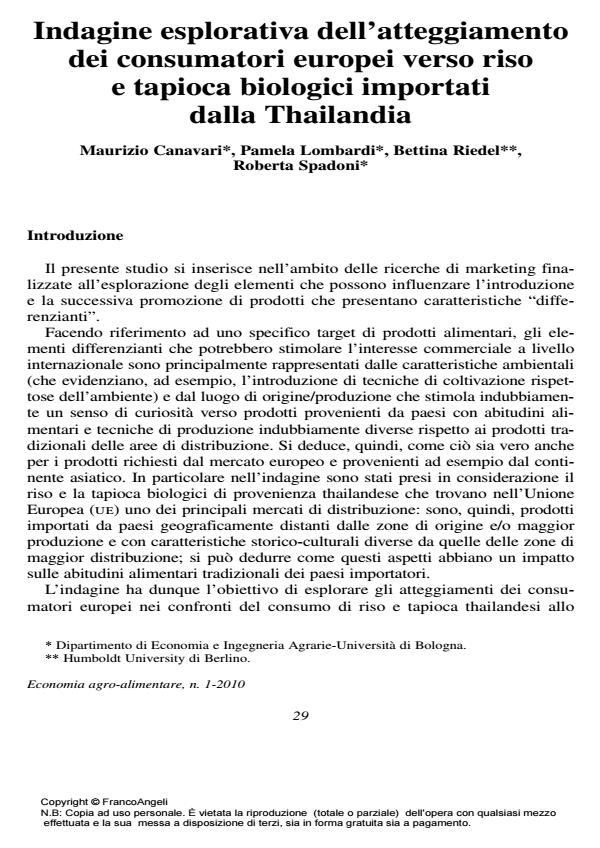Indagine esplorativa dell’atteggiamento dei consumatori europei verso riso e tapioca biologici importati dalla Thailandia
Titolo Rivista ECONOMIA AGRO-ALIMENTARE
Autori/Curatori Maurizio Canavari, Pamela Lombardi, Bettina Riedel, Roberta Spadoni
Anno di pubblicazione 2010 Fascicolo 2010/1
Lingua Italiano Numero pagine 18 P. 29-46 Dimensione file 298 KB
DOI 10.3280/ECAG2010-001003
Il DOI è il codice a barre della proprietà intellettuale: per saperne di più
clicca qui
Qui sotto puoi vedere in anteprima la prima pagina di questo articolo.
Se questo articolo ti interessa, lo puoi acquistare (e scaricare in formato pdf) seguendo le facili indicazioni per acquistare il download credit. Acquista Download Credits per scaricare questo Articolo in formato PDF

FrancoAngeli è membro della Publishers International Linking Association, Inc (PILA), associazione indipendente e non profit per facilitare (attraverso i servizi tecnologici implementati da CrossRef.org) l’accesso degli studiosi ai contenuti digitali nelle pubblicazioni professionali e scientifiche.
This paper deals with the introduction and promotion of innovative and differentiating products in distribution places geographically far and culturally different by the country of origin/production. In an international trade context, environmental elements (e.g. the introduction of organic agriculture) and the role of the country of origin/production could influence the consumers’ perception of the distribution places. This study is aimed at deepening the knowledge about European consumer attitudes towards Thai organic rice and tapioca imported from Thailand. In particular, the purpose was to explore relevant attributes for the quality product perception, motivations for purchasing, limiting factors, reasonable price brackets, trust elements. In this first phase of research, a qualitative approach was used. Four focus groups in different European countries (Germany, Greece, Italy and Scotland-UK) were administered by one or two investigators each. The participants were recruited using a convenience sampling method, gathering 6-8 persons per focus group). The discussions were recorded, transcribed and analysed through a qualitative approach. Finally, an exhaustive list of semantic categories was created, explained and supported by parts of the discussions. The results show that the participants still do not know much about these products, especially about tapioca. They tend to favour the product’s nutritional aspects, followed by its taste and smell, which in any case were not deemed satisfactory; however, they want also that a series of social and environmental benefits are satisfied. In general, Thai organic rice is perceived as a "different type" of rice and tapioca as a "new product". The most important critical issues affecting participant’s opinions include: the lack of trust in the certification process by foreign countries and the low attitude towards trying food novelties seemed due to a sense of loyalty to (or affection for) local food traditions. One of the most important trust elements is represented by the brand of the distributor, the producer and the EU and national certification bodies; in particular, participants associate some parameters of guarantee and safety to brand’s name. The information obtained could be useful in further explorations of this topic and it needs to be tested with a quantitative approach in order to obtain an evaluation of the relative importance of the different semantic categories.
Parole chiave:Marketing of quality food products, differentiating elements, international trade context, focus group, semantic categories
Jel codes:Q13
Maurizio Canavari, Pamela Lombardi, Bettina Riedel, Roberta Spadoni, Indagine esplorativa dell’atteggiamento dei consumatori europei verso riso e tapioca biologici importati dalla Thailandia in "ECONOMIA AGRO-ALIMENTARE" 1/2010, pp 29-46, DOI: 10.3280/ECAG2010-001003